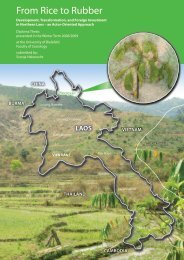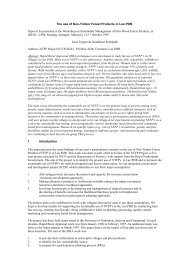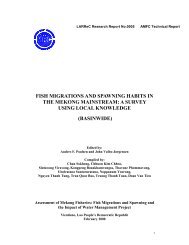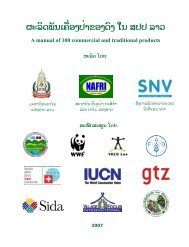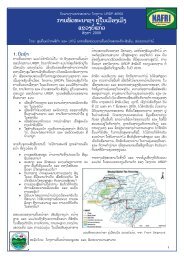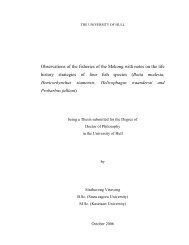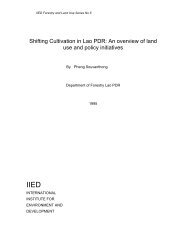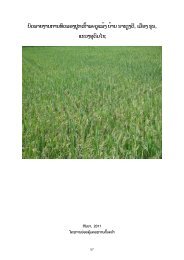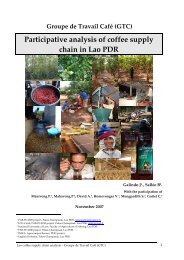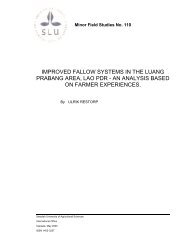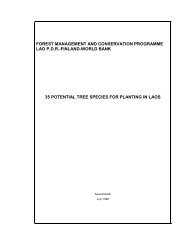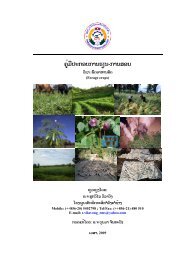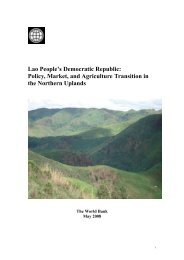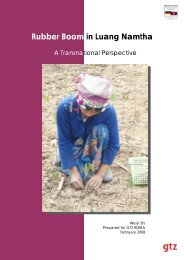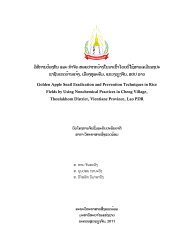Contract Farming in Lao PDR: Cases and Questions - LAD - nafri
Contract Farming in Lao PDR: Cases and Questions - LAD - nafri
Contract Farming in Lao PDR: Cases and Questions - LAD - nafri
You also want an ePaper? Increase the reach of your titles
YUMPU automatically turns print PDFs into web optimized ePapers that Google loves.
4. Explore opportunities for policies <strong>and</strong> regulations that<br />
favour long-term commitments between buyers <strong>and</strong><br />
farmers.<br />
5. Provide <strong>in</strong>centives for farmers to form natural,<br />
cohesive, dedicated groups.<br />
1.2 Is farm<strong>in</strong>g under contract appropriate for all<br />
farmers <strong>in</strong> <strong>Lao</strong>s?<br />
Whether contract farm<strong>in</strong>g is appropriate for farmers <strong>in</strong><br />
<strong>Lao</strong>s will vary at any particular time depend<strong>in</strong>g on the<br />
dem<strong>and</strong>s of the market <strong>and</strong> farmers’ ability to respond.<br />
As the market is <strong>in</strong> constant flux what may work for<br />
one farmer this year may not work next year. Generally,<br />
however, a farmer who has secure access to l<strong>and</strong> of good<br />
quantity <strong>and</strong> quality, <strong>in</strong> close proximity to sealed roads that<br />
connect with thriv<strong>in</strong>g markets or a factory, is better placed<br />
to benefit from contracts, especially those for higher value,<br />
more <strong>in</strong>tense, niche or specialist crops.<br />
2. Avoid subsidies.<br />
3. Cont<strong>in</strong>ue, accelerate <strong>and</strong> exp<strong>and</strong> ongo<strong>in</strong>g projects to<br />
improve roads <strong>and</strong> access to markets.<br />
4. Devise education programmes to help traders <strong>and</strong><br />
processors improve their management skills for contract<br />
farm<strong>in</strong>g.<br />
1.3 Does contract farm<strong>in</strong>g discrim<strong>in</strong>ate aga<strong>in</strong>st<br />
poorer farmers?<br />
<strong>Contract</strong>s aim to reduce risks <strong>and</strong> maximise profits. This<br />
can <strong>in</strong> some circumstances leave the poorest farmers at<br />
a disadvantage as their farms may <strong>in</strong>clude some or all of<br />
the follow<strong>in</strong>g features: small plots, poor soils, marg<strong>in</strong>al l<strong>and</strong><br />
such as hillsides. They may also be far from sealed roads<br />
with regular, cheap, reliable transport to thriv<strong>in</strong>g markets or<br />
processors. Moreover as contract farm<strong>in</strong>g typically requires<br />
farmers to provide l<strong>and</strong> it generally precludes l<strong>and</strong>less<br />
people, often among the poorest <strong>in</strong> any given region.<br />
Successful contract farm<strong>in</strong>g <strong>in</strong> <strong>Lao</strong>s typically <strong>in</strong>volves<br />
farmers with at least some awareness <strong>and</strong> experience of the<br />
market usually <strong>in</strong> areas well served by roads often close to<br />
major markets or processors <strong>in</strong> Thail<strong>and</strong> <strong>and</strong> Ch<strong>in</strong>a, such<br />
as Bokeo [corn], Luang Nam Tha [watermelons; FUF],<br />
Vientiane municipality <strong>and</strong> prov<strong>in</strong>ce, <strong>and</strong> Champasak,<br />
especially the Bolavens [cabbages; coffee].<br />
<strong>Contract</strong>s can be particularly beneficial for empower<strong>in</strong>g<br />
women farmers when they are paid directly for their<br />
work rather than via the household head, typically male<br />
(Simmons 2002, p.19). Phil Simmons exam<strong>in</strong>ation of<br />
contract farm<strong>in</strong>g <strong>in</strong> develop<strong>in</strong>g countries noted firms<br />
preference for larger farmers because they offer lower<br />
costs <strong>and</strong> potentially higher output (p.15). Subsidised<br />
<strong>in</strong>puts <strong>in</strong>tended to promote contract farm<strong>in</strong>g <strong>in</strong> Africa<br />
attracted some farmers seek<strong>in</strong>g cheap supplies provok<strong>in</strong>g<br />
scepticism among farmers with greater commitment<br />
(Coulter 1999).<br />
<strong>Contract</strong> farm<strong>in</strong>g’s prospects are dim without competent<br />
traders or firms to manage farmers <strong>and</strong> their own staff<br />
to keep production on track, solve problems quickly <strong>and</strong><br />
prevent corruption (Simmons 2002, p.14). Experience <strong>in</strong><br />
Vietnam shows that firms need good logistics, market<br />
access <strong>and</strong> adaptiveness to make a success of contract<br />
farm<strong>in</strong>g (W<strong>and</strong>schneider 2006).<br />
Possible <strong>in</strong>terventions:<br />
1. Review contract farm<strong>in</strong>g policy <strong>and</strong> oversight to give<br />
more emphasis <strong>and</strong> support to those who do the work<br />
<strong>and</strong> less on the household head.<br />
The picture is mixed. Successful cash cropp<strong>in</strong>g is dom<strong>in</strong>ated<br />
by people with cash who are not poor (National Statistics<br />
Centre/ADB 2006, p.27). Along the Mekong some very poor<br />
farmers with small fields were grow<strong>in</strong>g corn under contract<br />
while others were not because their fields were not suited<br />
to corn due to the soil type <strong>and</strong> location [corn]. It seems <strong>in</strong><br />
Bokeo the trader will not work with poor farmers directly <strong>in</strong><br />
future to grow chillis or other crops under contract [chilli].<br />
Attempts, with some success it seems, are be<strong>in</strong>g made by<br />
FUF <strong>in</strong> Luang Nam Tha to work with farmers who given their<br />
relative remoteness might be passed over by other traders or<br />
processors [FUF]. <strong>Contract</strong><strong>in</strong>g for eucalyptus <strong>in</strong> Savannakhet<br />
is potentially pro-poor given the company’s stated desire to<br />
plant on marg<strong>in</strong>al l<strong>and</strong> [eucalyptus].<br />
Simmons study of contract farm<strong>in</strong>g <strong>in</strong> develop<strong>in</strong>g countries<br />
notes that dem<strong>and</strong> for l<strong>and</strong>, labour <strong>and</strong> other goods <strong>and</strong><br />
services may rise <strong>in</strong> communities where contract farm<strong>in</strong>g<br />
becomes significant potentially upsett<strong>in</strong>g traditional balances<br />
which may displace other crops while narrow<strong>in</strong>g markets for<br />
some product or services. This may result <strong>in</strong> a change <strong>in</strong><br />
relative <strong>in</strong>comes, disturb<strong>in</strong>g social hierarchies <strong>and</strong> lead<strong>in</strong>g<br />
to a decl<strong>in</strong>e <strong>in</strong> reciprocal relations hold<strong>in</strong>g communities<br />
together.<br />
The poor are particularly vulnerable to experience negative<br />
consequences of these changes, especially those with little<br />
l<strong>and</strong> or unable to partake <strong>in</strong> contract<strong>in</strong>g (Simmons 2002,<br />
p.21). Poverty may deepen for those unable to engage <strong>in</strong><br />
contract farm<strong>in</strong>g (p.19). In Vietnam poor farmers contract<br />
49



